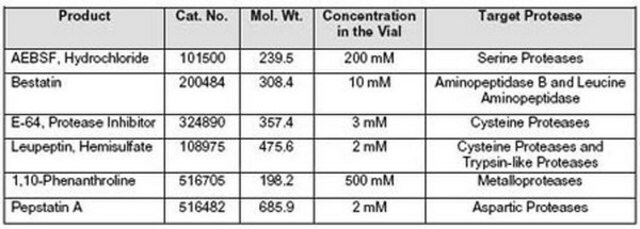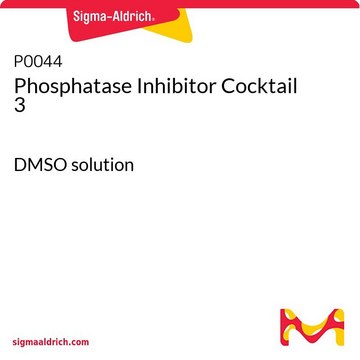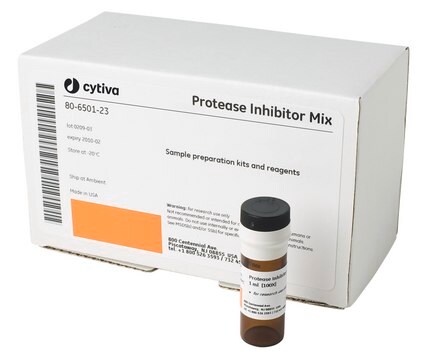539132
Protease Inhibitor Cocktail II
lyophilized, for the inhibition of aspartic, cysteine, serine, metalloproteases and aminopeptidases. This small molecule/inhibitor is primarily used for Protease Inhibitors applications.
Sinónimos:
Protease inhibitor cocktail
About This Item
Productos recomendados
product name
Protease Inhibitor Cocktail Set II, The Protease Inhibitor Cocktail Set II controls the activity of Protease. This small molecule/inhibitor is primarily used for Protease Inhibitors applications.
Quality Level
form
lyophilized
manufacturer/tradename
Calbiochem®
storage condition
OK to freeze
desiccated (hygroscopic)
shipped in
wet ice
storage temp.
−20°C
General description
1 set (1 vial of protease inhibitor cocktail plus 1 vial of 1.0 ml DMSO)
5 sets (5 vials of protease inhibitor cocktail plus 5 vials of 1.0 ml DMSO)
Specificity
Application
Biochem/physiol Actions
Aspartic, cysteine, serine, and metalloproteases as well as aminopeptidases
Warning
Reconstitution
Legal Information
signalword
Warning
hcodes
Hazard Classifications
Eye Irrit. 2 - Skin Irrit. 2
Storage Class
10 - Combustible liquids
flash_point_f
188.6 °F
flash_point_c
87 °C
Certificados de análisis (COA)
Busque Certificados de análisis (COA) introduciendo el número de lote del producto. Los números de lote se encuentran en la etiqueta del producto después de las palabras «Lot» o «Batch»
¿Ya tiene este producto?
Encuentre la documentación para los productos que ha comprado recientemente en la Biblioteca de documentos.
Los clientes también vieron
Nuestro equipo de científicos tiene experiencia en todas las áreas de investigación: Ciencias de la vida, Ciencia de los materiales, Síntesis química, Cromatografía, Analítica y muchas otras.
Póngase en contacto con el Servicio técnico















